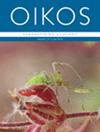与气候变化有关的非生物因素对地上和地下植物相关微生物影响的荟萃分析
IF 3.1
2区 环境科学与生态学
Q2 ECOLOGY
引用次数: 0
摘要
非生物环境对与植物相关的微生物有很大影响,决定了它们与植物的相互作用以及由此产生的生态系统过程。然而,这些非生物环境对植物与微生物相互作用的影响往往非常具体,而且取决于非生物环境的驱动因素或微生物群,因此需要开展综合工作,描述一般模式,并由此提出假设和指导机理研究工作。为了解决这个问题,我们对与气候变化相关的非生物因素(即变暖、干旱和二氧化碳)对植物相关微生物的影响进行了荟萃分析,按照微生物分类学或生物类群(细菌、真菌或病毒)以及发现微生物或与微生物相关的植物部位(叶球层或根瘤层)进行了区分。我们发现了非生物驱动因素的特定模式,其中干旱显著降低了微生物丰度,而气候变暖和二氧化碳排放则没有显著影响。此外,这些非生物影响取决于微生物分类群,真菌受干旱的负面影响,但受气候变暖的正面影响(eCO2 富集无影响),而细菌和病毒则不受任何因素的显著影响。同样,根瘤层微生物受干旱的负面影响,但受气候变暖的正面影响(eCO2 富集无影响),而植被层微生物受任何因素的影响都不明显。总之,这些发现通过强调与气候变化相关的非生物驱动因素对植物相关微生物的不同影响,以及这些影响对微生物生活史及其与植物相互作用性质的偶然性,对全球变化研究具有重要意义。本文章由计算机程序翻译,如有差异,请以英文原文为准。
A meta‐analysis of the effects of climate change‐related abiotic factors on aboveground and belowground plant‐associated microbes
The abiotic environment exerts strong effects on plant‐associated microbes, shaping their interactions with plants and resulting ecosystem processes. However, these abiotic effects on plant–microbe interactions are often highly specific and contingent on the abiotic driver or microbial group, requiring synthesis work describing general patterns and from this generate hypotheses and guide mechanistic work. To address this, we conducted a meta‐analysis of the effects of climate change‐related abiotic factors, namely warming, drought, and eCO2 , on plant‐associated microbes distinguishing by microbial taxonomic or biological group (bacteria, fungi or virus) and the plant part where microbes are found or associated with (phyllosphere or rhizosphere). We found abiotic driver‐specific patterns, whereby drought significantly reduced microbial abundance, whereas warming and eCO2 had no significant effects. In addition, these abiotic effects were contingent on the microbial taxonomic group, with fungi being negatively affected by drought but positively affected by warming (eCO2 enrichment had no effect), whereas bacteria and viruses were not significantly affected by any factor. Likewise, rhizospheric microbes were negatively affected by drought but positively affected by warming (eCO2 enrichment had no effect), whereas phyllospheric microbes were not significantly affected by any factor. Collectively, these findings point to important implications for global change research by highlighting contrasting effects of climate change‐related abiotic drivers on plant‐associated microbes and the contingency of such effects on microbe life histories and the nature of their interactions with plants.
求助全文
通过发布文献求助,成功后即可免费获取论文全文。
去求助
来源期刊

Oikos
环境科学-生态学
CiteScore
6.20
自引率
5.90%
发文量
152
审稿时长
6-12 weeks
期刊介绍:
Oikos publishes original and innovative research on all aspects of ecology, defined as organism-environment interactions at various spatiotemporal scales, so including macroecology and evolutionary ecology. Emphasis is on theoretical and empirical work aimed at generalization and synthesis across taxa, systems and ecological disciplines. Papers can contribute to new developments in ecology by reporting novel theory or critical empirical results, and "synthesis" can include developing new theory, tests of general hypotheses, or bringing together established or emerging areas of ecology. Confirming or extending the established literature, by for example showing results that are novel for a new taxon, or purely applied research, is given low priority.
 求助内容:
求助内容: 应助结果提醒方式:
应助结果提醒方式:


